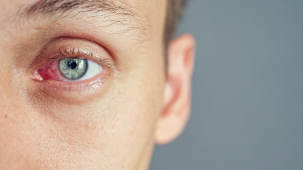
Conjunctivitis |
| 29.08.2022 |
 Conjunctiva – the mucous membrane that protects the eyes against injuries and infections. It is also responsible for spreading tears over the surface of the eyes. It is very sensitive to any type of irritation that can lead to inflammation.
Conjunctiva – the mucous membrane that protects the eyes against injuries and infections. It is also responsible for spreading tears over the surface of the eyes. It is very sensitive to any type of irritation that can lead to inflammation.
There is conjunctivitis when the conjunctiva is irritated due to infection or allergy. The eyes are red and puffy, and sometimes there might be some discharge. The inflammation can occur in one or both eyes, and some types of inflammation are highly contagious (easily spread from person to person).
Active conjunctivitis is a temporary contraindication to performing a laser vision correction procedure.
Viral conjunctivitis – occurs alone or is one of the symptoms of a viral infection, such as a common cold or flu. The eyes are reddened, with a burning sensation, and the eyelids are tender. In the case of this type of conjunctivitis, there are no particular treatment methods, and the body fights the virus on its own.
Bacterial conjunctivitis – the eyes are sore and red, with or without purulent discharge. An ophthalmologist prescribes suitable antibiotic eye drops depending on the severity of the symptoms.
Allergic conjunctivitis – results from a reaction with an allergen, such as flower or tree pollen, or animal hair. This type is not contagious. It causes bothersome itching, redness, and tearing. The eyelids may be swollen. Allergic conjunctivitis appears suddenly (immediately after the contact with the allergen) or occurs chronically (for instance in the spring, during the pollen season). It is recommended to use antiallergic eye drops.
Contact conjunctivitis – is caused by a chemical substance or its vapours that got into the eye. In such a case, the eyes should be thoroughly rinsed. An ophthalmologist may additionally recommend using medication in the form of ointment or eye drops.
Conjunctivitis is usually self-limiting and lasts approximately 1-2 weeks. If the symptoms do not disappear within this time, you should consult an ophthalmologist. The ailments should not be underestimated, because untreated conjunctivitis may result in chronic inflammation and deterioration of vision. If you have observed any alarming symptoms, make an appointment for a specialist ophthalmic examination, during which a doctor will thoroughly examine your eyes and choose the most suitable treatment.